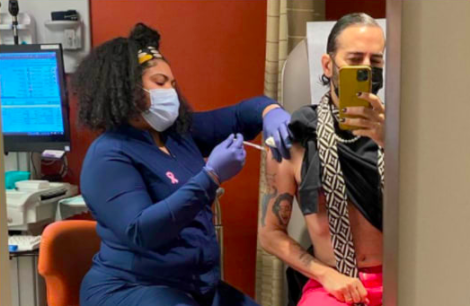
Image: Instagram/@themarcjacobs via ETX Studio
They are becoming ever more frequent in our feeds. Sometimes they are taken right during the crucial moment itself. Sometimes they’re taken afterwards, showing a vaccination card (though that’s ill-advised) or an arm with a bandage as proof and badge of honor.
The vaccination selfie has already been a thing for a few months now, but as vaccination roll-out programs get more inclusive and comprehensive, you’re bound to be seeing more and more in your social channels. And like most any social media phenomenon, there are feel-good vibes, FOMO, backlash and socioeconomic complexities all mixed in.
This week, two big names added their vaccination selfies to the mass.
Both Marc Jacobs and Dolly Parton posted images of themselves getting the jab; both were carefully attired for the occasion and both were flaunting their shoulders. And since it is an event, and also, for many, one of the few big outings they have had in the past year, many people are dressing up in a trend Mel magazine has dubbed “vaxcore.”
Many women, like Parton, have chosen shoulder-revealing tops, while some men like Marc Jacobs have carefully arranged their shirts to reveal their biceps. France’s health minister Olivier Véran posted a pic of himself getting the AstraZeneca jab in a much commented-on post that attracted headlines about his gym-toned physique.
The posts testify to the vaccinated’s sense of relief and even joy; in many such posts the vaccine has taken on a symbolic meaning. The message is that it’s a sign that we will get back to normal life. There is also of course a public message at play in such posts; the person posting is saying, “I endorse the vaccine,” a positive message that can help convince the vaccine-hesitant. As the Washington Post points out, the vaccine selfie makes it normative, much like the posts people make on voting day, “I voted,” now it is “I’m vaccinated.” The pride is similar and encapsulates the notion that this act is both for the individual and the community.
And the public service aspect didn’t originate with social media. Elvis Presley famously got vaccinated for polio on “The Ed Sullivan Show” in 1956, when as the Scientific American outlines, “immunization levels among American teens were at an abysmal 0.6%.” The publication breaks down the importance of the moment, which worked to boost vaccination rates: “Elvis’s public act contained three crucial ingredients inherent to many of the most effective behavioral change campaigns: social influence, social norms and vivid examples.”
But uneven distribution of and access to the vaccines against COVID-19 make the matter more complicated. And this is where the controversy comes in. Different countries of course have different policies as to who can get a vaccine at this time, while at the root of that are hugely unequal national supplies.
But even within one territory itself, inequalities are highlighted, as individuals with influence and access to better health care find it easier to get vaccinated or simply by luck of being at the right place at the right time. An article in The Conversation by a Canadian doctor noted that vaccine selfies can be a trigger of “anxiety, anger and envy.” While the article is essentially discussing access among healthcare workers in Canada, the FOMO (fear of missing out) created by the sharing of these images is sparking backlash and even accusations of queue-jumping.
Indeed, while Marc Jacobs simply captioned his post “I’ve been Pfizer’d,” Dolly Parton who made a substantial donation to help fund the development of the Moderna vaccine, made clear in her video on the post that she was not jumping any queue: “I am old enough to get it and I am smart enough to get it… I wanted to tell everybody that I think you should get out there and get it too.”
Meanwhile Jonathan Van Ness of “The Queer Eye” show outlined the specific conditions entitling individuals in New York to a vaccine and urged followers to check out their area.
So while FOMO may be justified, perhaps it’s a good thing to feel FOMO at this point in time. Perhaps it’s a key part of the mechanism that will help make the vaccination campaign work; that’s the suggestion of writer Will Leitch whose Medium opinion piece outlines that for Americans at least, these images mean the chance for others is coming. Maybe not this week, but soon.
He writes, “Every time someone posts one of their vaccine selfies, the comments are almost always some variation on ‘Good for you!’ and ‘So happy for you!’ As we all know, these two phrases are used exclusively when the person saying them wishes they were doing what the person posting the picture was doing.” He continues on by saying, “This will all be over soon.”
Meanwhile, many of the vaccination centers are encouraging selfies by setting up special designated photo stations with a frame that shows where the person got vaccinated and/or offering stickers or special-colored Band-Aids (pink in Toronto) as a visible sign of one’s vaccination.
So what’s the official etiquette if you do decide to take a vaccination selfie and post it?
Experts say not to include any personal information on your vaccination card or certificate in the photo if you include it. They also say if you take a picture during the actual deed like Marc Jacobs and Dolly Parton (instead of after the fact) to make sure to ask the healthcare professional’s permission beforehand. One should also be aware that your followers may have various fears and concerns, with some people choosing deliberately not to include needles.
Experts encourage making positive posts that can prompt real conversations with science-based answers to questions posed by anyone feeling hesitant about getting vaccinated for whatever reason. JB
RELATED STORIES:
Posting too many selfies (selfitis) a mental disorder? Researchers weigh in
Editing your selfies could be making you feel worse, says study